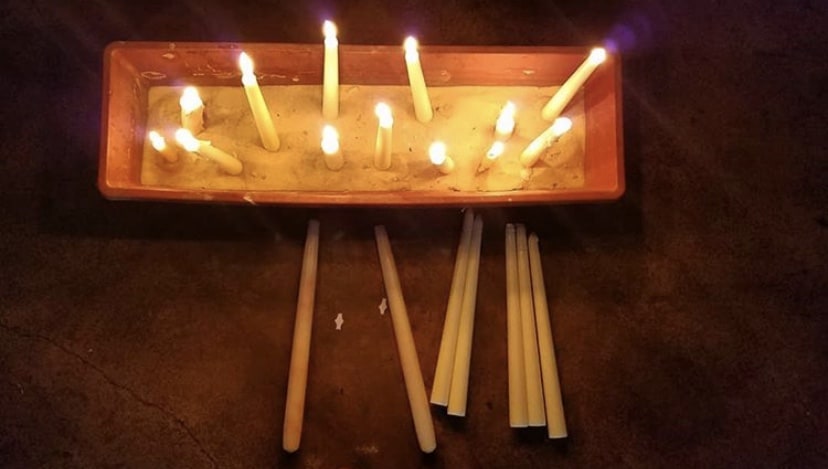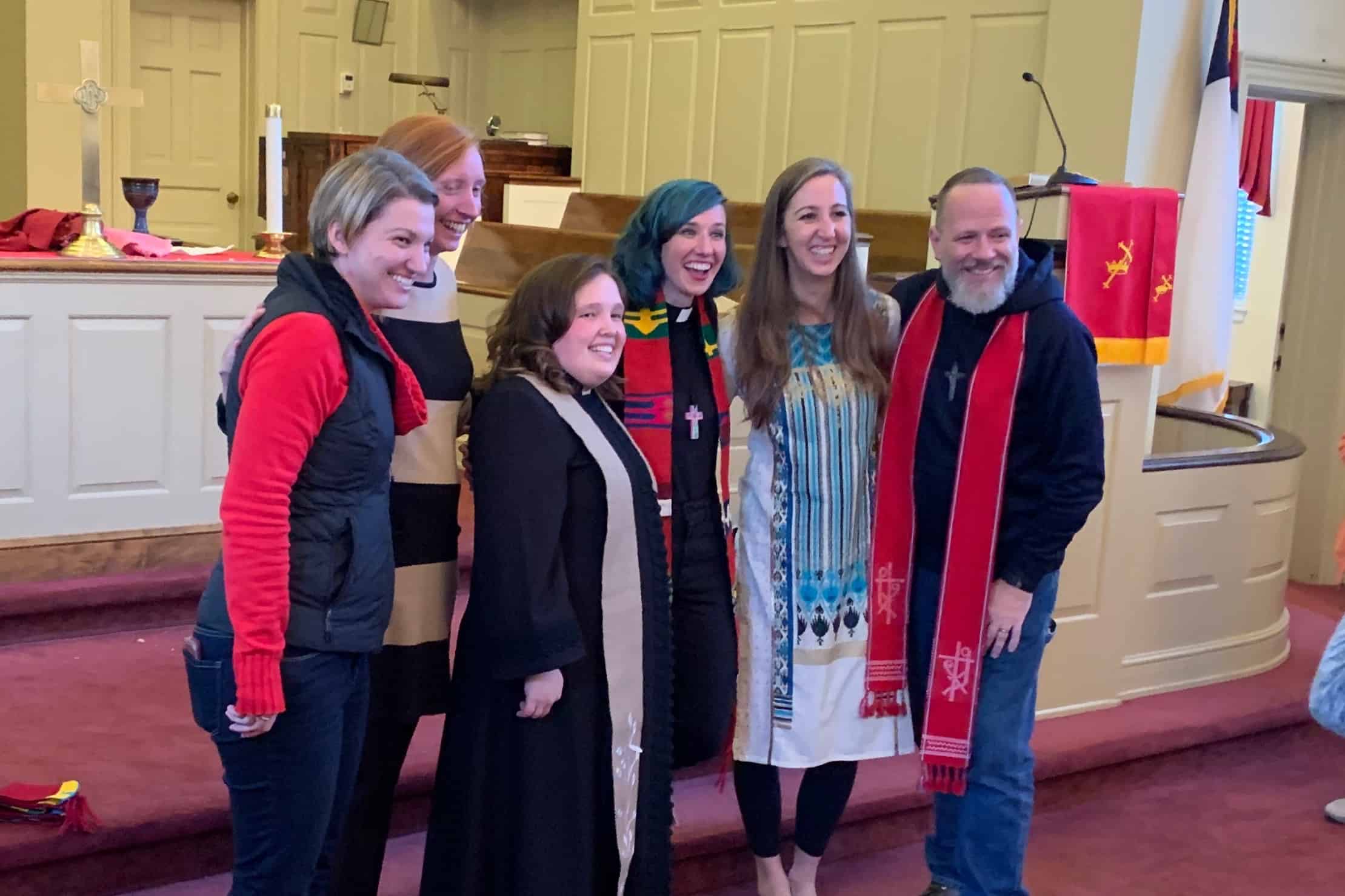By: Maggie Leonard
Ezekiel 37:1-14
Reflection-v. 14 “I will plant you on fertile land, and you will know that I am the Lord’
As I think about this verse in the Lenten context, I am reminded of a poem by my favorite poet, Hafiz. Daniel Ladinsky translates it from Persian as follows – ‘What plant can grow if you keep lifting it from the soil? Let your roots expand unchecked into a forest, a river, a song, or some verse you hold tenderly. You need to become quiet for this, as roots work in silence beneath the earth’s silhouettes. Draw from souls all you ever could want above, below, and to the side, and within us, within us just love.’ Having the gifts of nutrients available isn’t enough, we have to do our part to receive them. This call to silence is probably the most difficult part for many of us. Last year for one of my classes, I had to devise an experiment on myself to change a habit. I decided that I wanted to walk my dog more often. I failed miserably. I realized that I failed because while I wanted to change my habit, I had not really done the work of changing my attitude and heart. Post-experiment, I worked to make these deeper changes and my dog walking habits did indeed shift as well. For many of us, we will have to actively seek to change our attitudes about taking time for silence – to really prioritize that time in our hearts. It is there that we will grow in depth, nurtured by God’s gifts of love – drawing it in from every direction. It’s in receiving this goodness that we truly start to understand and know who God is.
Prayer God of life, nurture us that we may ever grow deeper roots in love.
Monday, March 30
By: Maggie Leonard
Ezekiel 37:1-14
Reflection—v. 2 ‘they were very dry’
I have a confession for y’all. I kill plants. Especially house plants. I’ve even killed rosemary, which is basically impossible to kill. I don’t do it on purpose, it just comes naturally to me. I suspect they die because they are deprived of sunlight or water or new soil or a bigger pot… I’m never really sure. It’s probably mostly the watering though. I always know that it’s a bad sign when I try to water the plant and all the water trickles straight through the dry dirt. It’s like the dirt has been dry for so long that it has forgotten how to absorb water. At that point, it’s not necessarily a lost cause yet, but immediate attention is needed. It takes time, consistency, and patience to get the dirt to absorb water again. Pouring lots of water on it never works, on those occasions I end up with water all over the table. Instead, I have to drop ice cubes in the pot. As they melt slowly, the dirt has more time to soften and absorb. I think we can get like that too. If we deprive ourselves of God’s presence in the world, it doesn’t matter how much grace and mercy is poured upon us, we don’t absorb it. We can’t–not yet anyway. It takes time, consistency, and patience. Slowly but surely, as we attend to God we start to feel that love fill us again. Perhaps that’s one of the reasons why Lent is 40 days – if we haven’t been attentive to God’s presence, it will take some time to soften, absorb, and feel. It will happen though, have faith.
Prayer Patient and attentive God, soften our hearts that we may absorb your grace.
Sunday, March 29
By: Maggie Leonard
Ezekiel 37:1-14
Reflection—v. 9 ‘dead bodies’
Have you ever found yourself so busy that you forgot to eat? I am not one to forget to eat often–but every now and then, the momentum will carry me and I won’t know what time it is, much less that I haven’t eaten. Once I finally do slow down, or look at a clock, exhaustion and hunger hit. I’m tired, dead tired. Through the scriptures featured for this week, there is a theme of death. Real, full, smelly, dry death. I wonder if Ezekiel’s valley of bones knew that they weren’t living, even when the sinews and flesh appeared. Or if the Romans knew that selfishness was killing them and separating them from God. Or Lazarus? That one’s a doozy to begin with, I can’t even imagine what he was thinking. What seems clear, is that without God, without the Spirit, we aren’t truly living. A friend of mine recently took Benedictine vows. He lives at a little house of prayer in middle Georgia where the weary can find respite, prayer, and reflection on silent retreat. As we celebrated his decision, a fellow well-wisher reflected on the space that he, and his companions, hold for others. It is because they live a slow, prayer-filled, countercultural life that others can enter more deeply into the presence of God. Visitors take up the invitation to ‘be’ with God and are given the time and space to reset and reconnect with God. This Lenten season, may we have the awareness to see how weary we have become and have the courage to allow God to bring us to new life.
Prayer Living God, give us rest, give us nourishment, and bring us new life.
Psalm 121
By: Chad Hyatt
Reflection—v. 3 ‘the one who keeps you will not slumber’
The pastor didn’t sleep much that night. She was too alert to rest as she kept ‘watch o’er her flock,’ not unlike certain shepherds on a Christmas night long ago. But the sweet song of angels didn’t reward her vigilance. Instead, a chorus of antiphonal snoring and the persistent percussion of footsteps en route to the restroom announced the good news on this evening. For those nocturnal sounds could mean only one thing: her sleepless night had helped create the space for forty other souls to rest warm and safe—for one winter night at least. This psalm describes in tender detail the attentive care of our pastoral God, and hers is the image I call to mind. God isn’t asleep on the job. She’s watching over us, whether we’re sound asleep or wide awake, coming in or just about to head out. Our song, ‘Jesus Is a Sanctuary,’ explores this theme of a God who is the faithful refuge of her people. Singing it, we remind ourselves that God is indeed our our shelter and sanctuary. But we also remind ourselves that we are called to provide space for one another that is both sacred and safe. Jesus is indeed a sanctuary, but we are his body. As we ponder penance this Lent, let us repent of doors that are closed and sanctuaries that sit empty on cold nights, of pews and carpet that are unstained by human need, of policies and liability concerns that take the place of moral discernment and compassion. And let us give thanks, too, for churches like our partners’ that open their doors and for so many, like that pastor and countless other volunteers from many churches, who hear the call of the God who tenderly watches over her people, by day and by night.
Prayer God who never rests in your constant care for us, help us to care for one another always.


